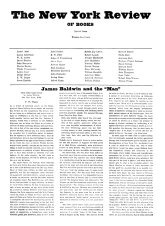Chester Kalllman’s first book, Storm at Castelfranco, was a very pretty performance technically, conspicuous even in a time when elegant prosody is fairly common. Four or five of the poems had, as well, a voice or character that set them apart from the merely intelligent verse that is nowadays disdained as academic. What one hoped for the poet has now happened. This voice, this character has grown more pronounced, surer of itself, and both more interesting and more eccentric in the seven years between his first and second books. Absent and Present is a serious, rather moral work. Its power derives from the way the poems meet with us honestly on powerful and complex human experiences. Its weakness is that occasional dullness that even the most passionate moralists fall into when their pace, their economy, fail to persuade. There are dull places in Wallace Stevens, Marianne Moore, and William Carlos Williams, if you ask me. Mr. Kallman’s poems earn this right and do not abuse it.
He knows very well how to match versification to the tone and content of a poem. The most artificial meters and rhyme-schemes are used for poems whose detachment is partly formal, partly ironic. “Look at the Ant,” for example, opens thus:
In human scale, the ant each day
About the globe would make his way
In search of winter meals;
I’ve watched him hoist a mastodon
Up to his head while dragging on
A redwood with his heels;
He seldom sleeps, he never sits
Nor ever reaps the benefits
Of charity appeals:
And men who emulate with love
The ant are soon the victims of
Impossible ideals.
At the other end of the spectrum of his prosody is Mr. Kallman’s use of syncopated rhyme, rhyme that corresponds to no established line, no logical emphasis or phrasing and has, therefore, the effect of a fastidious free verse. He uses it where the content of a poem is turbulent or irrational, as in this passage from the longest poem in the book, “The Only Child: Theme and Variations.”
I must give its true and familiar name to
Estranged love, must keep its particular good
Unglossed. Absence? I must bear witness
there were no fools
Present at the birthday party nobody came to.
Twenty blobs of raspberry jello stood
In two rows settling into small red pools?
This is one of the poems that occasionally grows slow and over-earnest, but it is very secure in its intention and sustains a clear structure of imagery. It has a strangeness of persona, a deliberate queerness, that suggests modern German poetry.
There are a dozen other first-rate, full-size poems in Absent and Present. “Missing the Sea,” “Gifted,” and “Weighty questions” strike me as speaking out in the character Mr. Kallman has mastered—sure, cranky sometimes, recognizable and expressive almost always.
This Issue
February 1, 1963



